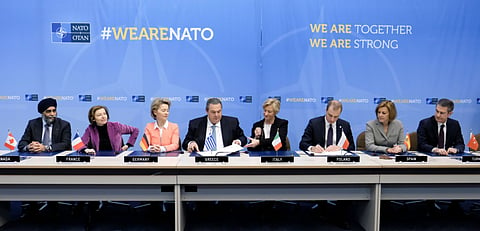NATO agrees to training mission in Iraq
Military alliance to train Iraqi soldiers as they clear unexploded remnants of war left behind by Daesh

Brussels: NATO defence ministers agreed on Thursday a bigger ‘train-and-advise’ mission in Iraq after a US call for the alliance to help stabilise the country after three years of war against Daesh.
Part of a broader international effort to help rebuild Iraq as combat operations wind down, the NATO military alliance will train Iraqi soldiers as they clear unexploded remnants of war left behind by Daesh, but will not provide troops for combat.
“We will go to a consistent mission in Iraq,” US Secretary of Defense Jim Mattis told a news conference, after formally requesting NATO involvement last month in a letter to allies.
Mattis said the NATO mission would train Iraqis to “protect their people against an uprising of another type of terrorism organisation,” as the United States seeks to avoid a repeat of its 2011 withdrawal from Iraq and the subsequent rise of Daesh.
The alliance must now set the scope of the mission with the aim of launching it in July at a NATO summit set to be attended by US President Donald Trump.
NATO already has a small training presence in Baghdad but Trump has insisted the alliance do more to counter militants in Iraq, warning of more attacks in European cities if it did not.
European allies have long been reluctant, fearing another open-ended assignment after more than a decade in Afghanistan.
Talks with Turkey have been complicated by a dispute between Ankara and Washington in the fight against Daesh in Syria, diplomats said.
But all allies now back a larger, formal mission, diplomats said, after a personal plea from Mattis on Thursday and assurances that their military trainers would be out of harm’s way.
Iraqi Prime Minister Haider Al Abadi sent a letter requesting NATO help this week, they said.
NATO’s involvement comes as Iraq faces a bill of more than $88 billion to rebuild the country, officials told a donor conference in Kuwait this week.
Iraq declared victory over Daesh in December, having taken back all the territory captured by the militants in 2014 and 2015.
“The lesson learned from Iraq it is dangerous to leave too early because we may be forced back into combat operations,” NATO Secretary-General Jens Stoltenberg told reporters, referring to the 2011 US withdrawal.
NATO governments must still decide on troop numbers, while there is also the more difficult issue of who might provide protection for allied trainers, particularly if troops were to work in the restive, semi-autonomous Kurdistan region.
Germany’s Defence Minister Ursula von der Leyen said she supported a training mission for Iraq, with a special focus on training soldiers in bomb disposal, military medicine and building up the country’s security institutions.
She insisted that Germany’s presence would be less than the country’s combat operations deployed to support the US-led coalition fighting Daesh.
“It will be smaller than what we have at the moment with 1,350 people deployed in Iraq and Syria.”
However, one senior NATO diplomat said the mission will need to be more than several hundred troops to be effective and to have training centres beyond the capital.
Former NATO chief Anders Fogh Rasmussen told Reuters that NATO’s reluctance to do more in the Middle East until now had been bad for the alliance’s image.
He proposed a $1 billion fund to support the training efforts, although financing the new mission needs to be discussed by allied governments.
“I fully agree with the Americans. If NATO is to live up it its name, it must do more on counter-terrorism,” he said.
Sign up for the Daily Briefing
Get the latest news and updates straight to your inbox



